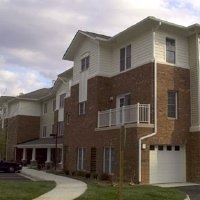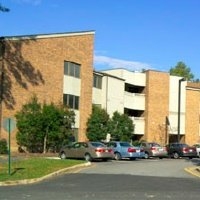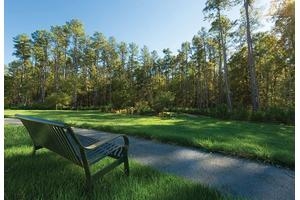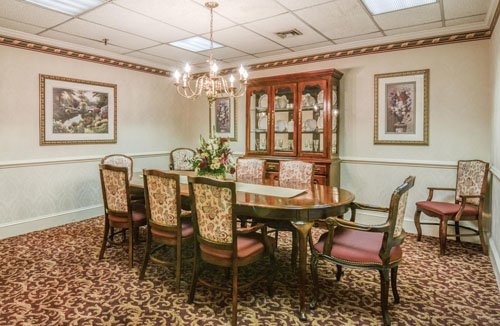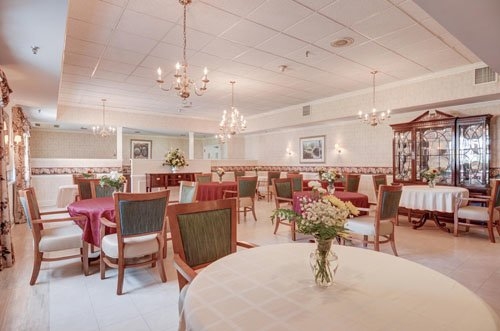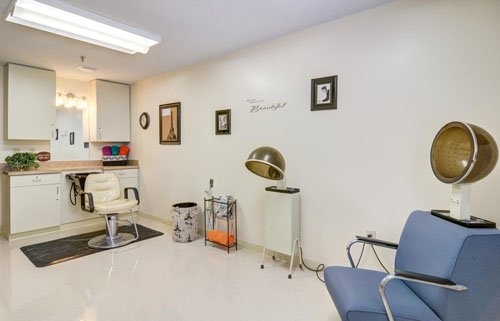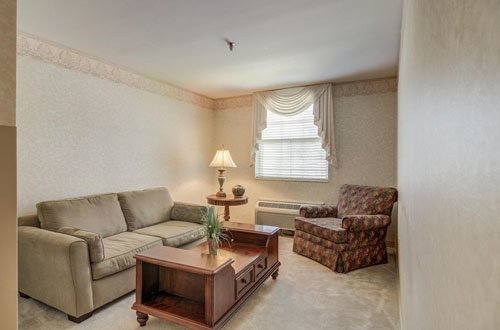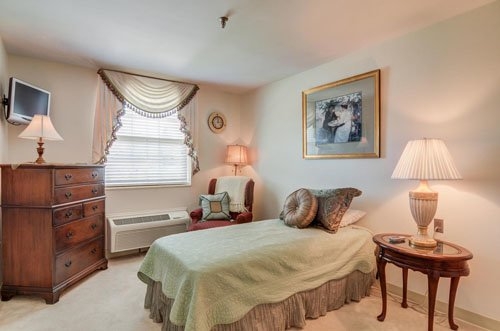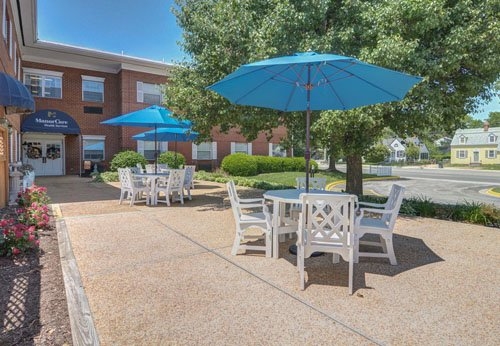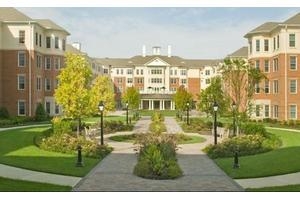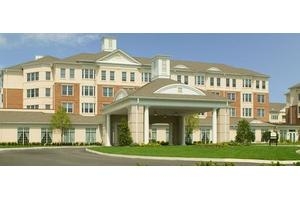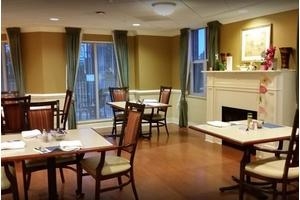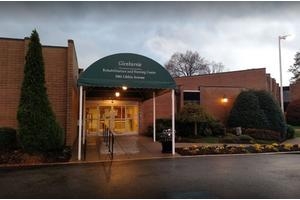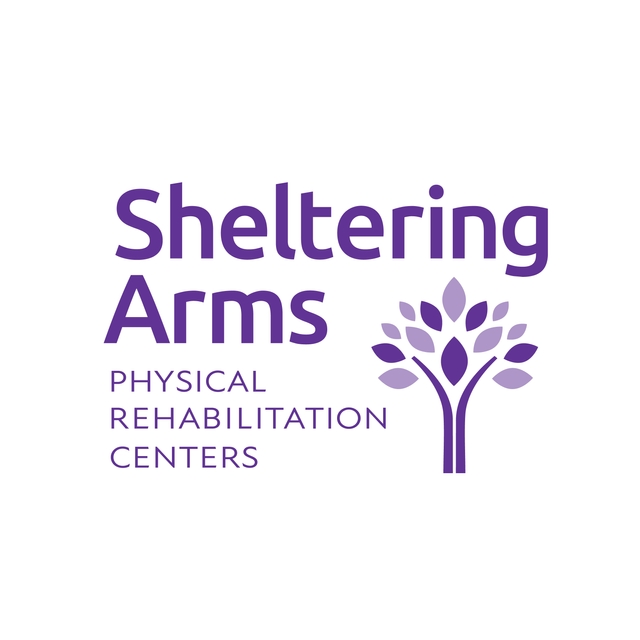Nursing Homes in Virginia
When a loved one becomes disabled or chronically ill and requires around-the-clock care, helping them transition to a nursing home may be the best choice. Nearly 16% of Virginia’s population is aged 65 and above, with 19,550 of those living in nursing homes across the state. In this type of setting, seniors receive personal care and skilled nursing services, such as medication administration and management of long-term conditions. Room and board, meals and recreational activities are typically included in the cost of nursing home care. In Virginia, a shared semiprivate room at a nursing home costs about $7,665 per month; seniors who’d prefer a private room can expect to pay $8,821.
In this guide, we explore the cost of nursing home care in Virginia and describe a number of resources, programs and waivers that can help families pay for the care seniors need.
The Cost of Nursing Home Care in Virginia
Nursing home care in Virginia is slightly cheaper than the national average of $7,756 according to the 2020 Genworth Cost of Care Survey, This makes it one of the most affordable options in the Mid-Atlantic. In Maryland, for example, prices skyrocket to $10,190 for a semiprivate room. Rates in West Virginia are even higher at $11,376. North Carolina and Tennessee are more affordable than Virginia, however, with prices around $7,300 and $7,072 respectively.
Rates for nursing home care vary considerably across Virginia. In the Winchester area, prices are the highest in the state at $9,566. Seniors in Harrisonburg pay slightly less at $9,125; to the south in Charlottesville, costs fall to $7,452. The lowest rates in Virginia can be found in the Lynchburg area. Seniors there pay just $6,644 for a semiprivate room. In the capital city of Richmond, costs rise to $9,064. Seniors in the Virginia Beach and Norfolk area pay the state average of $7,665.
Winchester
$9566
Harrisonburg
$9125
Richmond
$9064
Virginia Beach
$7665
Blacksburg
$7665
Roanoke
$7513
Charlottesville
$7452
Lynchburg
$6644
Aside from nursing home care, seniors in Virginia have other options, including assisted living communities, adult day care, in-home care and home health care. Adult day care provides meals, activities and supervision in a community-based setting; it’s the least-expensive option at $1,603 per month. At $4,195, in-home caregivers can offer companionship, personal care and assistance with daily activities of living. Home health care costs about $190 more and includes basic medical services in addition to regular home care. Assisted living, which costs $4,850, provides care in a residential setting. This type of care is suitable for seniors who don’t require constant supervision and are able to maintain a level of independence.
Adult day care
$1603
Home care
$4195
Home health care
$4395
Assisted living
$4850
Nursing home care
$7665
Does Medicaid Cover Nursing Home Care in Virginia?
In Virginia, there are over 1,739,600 residents enrolled in Medicaid. Once approved, seniors can receive coverage for nursing home placement and apply for other Medicaid programs. Coverage includes inpatient and outpatient hospital services as well as physician and laboratory services.
The state has over 280 nursing homes, and most accept Medicaid. Skilled nursing facilities can provide a higher level of care than what is available in assisted living or memory care communities. Alternatively, the Program of All-Inclusive Care for the Elderly (PACE) and the Commonwealth Coordinated Care Plus (CCC+) Waiver offer personalized care services in residential care facilities to prevent nursing home placement.
Medicaid Eligibility in Virginia
To be eligible for Medicaid in Virginia, the applicant’s monthly income must be at or below $2,724, and assets cannot exceed $2,000. Couples cannot make more than $5,484 per month, and they must have no more than $3,000 in assets although some items can be excluded, such as a home and vehicle. If only one spouse is applying for benefits, the other spouse may be able to retain up to $148,620 in additional assets.
2022 Basic Medicaid Income Limits for Seniors in Virginia
| Household Size | Number of Applicants | Income Limits Per Year* | Asset Limits: Applicant(s) | Asset Limits: Non-Applicants |
|---|---|---|---|---|
| One Person | 1 | $32,904 | $2,000 | |
| Two Person | 1 | $32,904** | $2,000 | $148,620 |
| Two Person | 2 | $65,808 | $3,000 |
*Except for a $40/mo. personal needs allowance, Medicare premiums and possibly a spousal income allowance for a non-applicant spouse, all of a recipient's monthly income must be put toward the cost of nursing home care.
**Income limit is for applicant only.
If the applicant’s income is higher than the limit, they may be able to spend down their income on medical services or by paying off debt if they meet specific requirements. Other qualifications include:
- Citizenship status
- Proof of residence
- Military discharge status, if applicable
How to Apply for Medicaid in Virginia
Seniors and loved ones can apply for Medicaid in Virginia online or over the phone. Paper applications can be completed and submitted to a local Department of Social Services office. To apply online, Virginians can use CommonHelp. Before starting the application, seniors and loved ones should properly prepare by collecting appropriate documentation.
Information You Will Need:
- Birth certificate or green card if born outside the United States
- Social Security card
- Medicare cards along with any other health insurance coverage
- Bank statements from up to 60 months before the date on the application
- Proof of earned and unearned income from the past 60 months, including 1099s
- Proof of pensions, including a letter from the provider
- Copy of life insurance policies
- Proof of real property that has been sold or transferred within the past 60 months
- Car registration and insurance
- VA discharge papers (Form DD 214) for veteran applicants
- Copies of documents pertaining to wills and trusts or powers of attorney
- Any documents the applicants can use to support their claim
Additional Medicaid Support & Resources in Virginia
Seniors and loved ones who are applying for Medicaid can use any of the resources listed below to assist them during the application process or to get help with financial planning for long-term care. If they haven’t applied yet, Benefits.gov has an eligibility screening tool that can give applicants peace of mind as they wait for their application to be approved.
| Resource | Contact | Service |
|---|---|---|
| Virginia No Wrong Door Network | (804) 662-7000 | The Department for Aging and Rehabilitative Services offers Virginians a one-stop shop for over 27,000 programs and services throughout the state. With a network of over 500 providers, No Wrong Door Virginia can help families and seniors find the right nursing home or access personalized care services that can delay nursing home placement. |
| Medicaid Planning Assistance | Online Only | The Medicaid Planning Assistance website offers a comprehensive guide to public and private Medicaid planners in addition to providing plenty of reading material for self-planners. Families and seniors can use the site to determine Medicaid eligibility and learn about Medicaid coverage. Users can also read about how to avoid application denials and apply for HCBS Waivers. |
| VirginiaNavigator | Online Only | VirginiaNavigator is a free website with a library of statewide and nationwide resources for seniors, veterans and disabled residents. Users can search for benefits by location and topic. The website also provides a list of books and articles that are relevant to the search query, such as guides for knowing when it's time for seniors to transition to long-term care facilities. |
| Benefits.gov | (855) 242-8282 | As the federal government’s official website for benefits, Benefits.gov gives Americans the ability to browse by category and provides a series of video guides on how to find the right benefits to support their families. Seniors and loved ones can use the SSA Benefit Eligibility Screening Tool (BEST) to determine their eligibility for Medicare and other government benefits. |
Does Medicare Cover Nursing Home Care in Virginia?
Medicare provides limited coverage for short-term stays in a skilled nursing facility following a hospital stay, but seniors must meet a number of specific requirements. This benefit is available to beneficiaries who have been hospitalized for at least three days, excluding the date of discharge, so it’s most valuable for those who are recovering from an injury, illness or surgery.
Once seniors meet the hospitalization requirement, Medicare will pay for up to 100 days of skilled nursing per benefit period. The first 20 days are covered in full. Starting on day 21, beneficiaries must pay a daily coinsurance rate. After day 100, seniors are responsible for the entire cost.
What Does Medicare Cover?
Medicare covers a number of specific services, including:
- Meals
- A semiprivate room
- Medications
- Skilled nursing
- Physical therapy
- Occupational therapy
- Speech therapy
- Audiologist care
- Medical supplies
- Medical social services
- Nutritional counseling
- Ambulance transportation
What Isn’t Covered by Medicare?
Medicare does not cover long-term custodial care that addresses seniors’ day-to-day needs. This includes help with daily activities, such as bathing, dressing and using medical equipment.
For more information about Medicare and when it covers Nursing Home Care, read our Guide to Nursing Homes.
Medicare Support & Resources in Virginia
While Medicare can’t cover all the costs of skilled nursing-level care, there are free programs designed to supplement Medicare coverage and help with out-of-pocket expenses. Whether families need help finding financial assistance or submitting an application, there are several websites providing detailed guides and free hotlines to address any questions or concerns.
| Program | Contact | Service |
|---|---|---|
| Virginia Insurance Counseling and Assistance Program (VICAP) | (800) 552-3402 | The Virginia Insurance Counseling and Assistance Program (VICAP) provides unbiased and free Medicare counseling to beneficiaries and their families. In addition to explaining the basics of each Medicare component, experienced counselors can help seniors better understand their current policy and coverage. Counselors can assist with filing claims and appealing denials or determining if an individual qualifies for financial assistance to cover out-of-pocket costs. |
| BenefitsCheckUp | (800) 794-6559 | Provided by the National Council on Aging, BenefitsCheckUp offers a free library of statewide and nationwide benefits. Users can search by category or fill out a quick survey to determine their eligibility. Families can find financial assistance for medications and other health care needs in addition to family caregiver support and tax relief programs for the elderly and disabled. The website is available in English and Spanish. |
| Medicare.gov | (800) 633-4227 | The official Medicare website offers a portal to apply for Medicare as well as lengthy articles about health care and drug plans. Users can explore the site's library of information on how to maintain benefits and what to do if they get fraudulent Medicare charges or lose their Medicare card. The website also provides a list of local medical and equipment providers. |
Other Financial Assistance Options for Nursing Home Care in Virginia
While Medicaid and Medicare are two of the most common programs used to pay for Nursing Home Care, there are other financial assistance options available, depending on your unique situation.
| Name | How To Apply | How It Works |
|---|---|---|
| Aid and Attendance | Learn more and apply online at va.gov. | Veterans who receive a VA pension may also be eligible for the Aid and Attendance benefit, a monthly cash allowance that veterans receive in addition to their standard pension amount. The benefit is intended for veterans in need of long-term care services and may be used towards paying for skilled nursing care. |
| Reverse Mortgages | Learn more about your options and how to apply at ftc.gov | If you own a home, you may be able to use a reverse mortgage to help pay for nursing care. Reverse mortgages are loans that one can take out against the value of their home, essentially converting some of the home's equity into cash. Reverse mortgage loans do need to be repaid with interest, typically within 12 months of receiving the loan. |
| Long-Term Care (LTC) Insurance | Learn more about Long-Term Care Insurance and how to apply for a policy at acl.gov. | Seniors who already have long-term care insurance may be able to use it to pay for skilled nursing care. Most policies cover at least a portion of the cost, but it depends on the specific policy terms. Note that older adults who are already in need of skilled nursing care will not typically be eligible to sign up for a LTC insurance policy. |
Free and Low-Cost Resources for Seniors in Virginia
There are many resources in Virginia that assist seniors in their retirement. Caring.com has compiled information on local organizations, programs and agencies and categorized them into care types for easy reference.
Area Agency on Aging
Retirees can find support and advice on various senior-related issues from their local Area Agency on Aging. The agency provides advice on topics such as financial assistance programs, in-home care and long-term care planning. It also connects seniors and caregivers with community-based resources.
| Program Name | Phone Number | Description |
|---|---|---|
| Virginia Area Agencies on Aging | There are 25 AAAs in Virginia, each of which provides seniors with information about services and programs in the state. Chronic Disease Self-Management Education (CDSME), a telephone reassurance check-in service and care coordination are a few of the available services Additional options range from residential repair and renovation programs to local transportation services for seniors. |
Cash Assistance Programs
Cash assistance programs in Virginia provide financial support to help low-income retirees remain in their own homes for as long as possible. Seniors and caregivers can apply for tax rebates and reductions, discounts on vital services and help covering the cost of heating and cooling their home.
| Program Name | Phone Number | Description |
|---|---|---|
| Virginia Lifeline Program | 800-234-9473 | The LifeLine Program offers a discount on landline or mobile telephone service, ensuring that participants can stay in contact with loved ones. |
| Virginia Auxiliary Grants | 804-545-1644 | Seniors who live in assisted living or in adult foster care can receive direct financial assistance under the Auxiliary Grant Program from the Virginia Department Of Social Services. Financial aid helps adults maintain a standard of living that meets a basic level of need. Seniors who apply for the program need to live in an approved facility and meet other criteria. Applicants need to be at least 65 and be a resident of Virginia for at least 90 days. Applicants must also need help with 1-2 ADLs. Seniors should contact their local Social Security office to learn more. |
Food Assistance Programs
Local organizations help ensure elderly citizens have a balanced diet and receive essential vitamins and minerals to remain healthy. Through nutrition programs, congregate meals, home-delivered meals and food pantries, these programs help Virginia seniors afford the nutritious food they need.
| Program Name | Phone Number | Description |
|---|---|---|
| Virginia Older Americans Congregate Nutrition Program | The Virginia Older Americans Congregate Nutrition Program serves nutritious meals to older adults in group settings such as senior centers, while the Home-Delivered Nutrition Program delivers meals to elderly individuals who are isolated and homebound. Adults aged 60 years and older, particularly those with low incomes and at risk of becoming institutionalized, are eligible for meals. The end goals of both programs are to reduce hunger and food insecurity, encourage socialization and promote the health and well-being of Virginia's aging population. | |
| Virginia Farm Market Fresh for Older Adults | 804-662-9333 | The Virginia Farm Market Fresh for Older Adults program distributes vouchers to qualifying Virginians aged 60 and older. Each voucher is worth $5, and 10 are given to eligible seniors. They can redeem between June 1 and November 18 at pre-approved roadside stands and farmers markets within the state to buy herbs, fruits and vegetables. Applicants must meet certain guidelines to qualify, including falling within a specific income range. |
| Virginia Commodity Supplemental Food Program (CSFP) | 804-786-3520 | The Virginia Commodity Supplemental Food Program provides low-income seniors with access to nutritious foods. Seniors must be 60 years of age or older and have an income at or below 130% of the federal poverty level to be eligible for this program. Qualifying seniors receive food boxes stocked with staples to supplement meals. These boxes may include canned meats, fruits, vegetables, shelf-stable milk, cheese, cereal, beans and pasta. |
| Virginia Supplemental Nutrition Assistance Program (SNAP) | 800-552-3431 | The Virginia Supplemental Nutrition Assistance Program provides electronic benefit transfer cards that help low-income Virginia seniors pay for nutritious food from local groceries and other retailers. Funds are automatically added to the debit cards each month. To qualify for this program, the members of a household must have a total monthly net income no higher than the poverty line. Seniors already receiving Temporary Assistance for Needy Families or Supplemental Security Income benefits may automatically qualify for SNAP benefits. |
Home Repair and Modifications
Seniors and those with disabilities can access a variety of local resources to help them pay for home repairs and modifications. Programs in Virginia have different eligibility criteria and often assist retirees by providing grants or loans.
| Program Name | Phone Number | Description |
|---|---|---|
| Virginia Emergency Home and Accessibility Repair Program | 804-371-7000 | EHARP provides emergency financial assistance to help correct urgent health or safety issues that could prevent you from remaining in your own home. Examples of eligible repairs include plumbing and electrical upgrades and wheelchair ramp construction or installation. |
| Virginia Weatherization Assistance Program (WAP) | 804-371-7000 | Sponsored by the state and federal government, WAP helps with the cost of energy-efficient home repairs and upgrades, such as installing insulation, sealing air leaks and repairing HVAC equipment. Home improvements can also enhance residents' health and safety. |
Legal Resources
Many organizations offer free or low-cost legal services to Virginia seniors. Older adults can access advice on issues such as estate planning, living wills and power of attorney. Some firms also act as long-term care ombudsmen, advocating for the rights of seniors in senior living communities.
| Program Name | Phone Number | Description |
|---|---|---|
| Virginia Poverty Law Center Helpline | 844-802-5910 | The Senior Legal Helpline provides assistance, advice and referrals for Virginia residents aged 60 and over. You can call the helpline and speak to attorneys at no cost on complex legal topics specific to seniors, such as long-term care issues, abuse and neglect, and public benefits like Medicaid. |
Senior Engagement
Senior engagement resources and programs in Virginia help older adults remain active and ensure they contribute to the community. Resources include wellness programs, volunteer opportunities, support groups and organizations that help residents connect with the community to live fulfilling lives.
| Program Name | Phone Number | Description |
|---|---|---|
| Virginia Dementia Services | 804-662-9154 | The Virginia Office for Aging Services provides dementia services throughout the state for those living with Alzheimer's disease and other forms of dementia. The office coordinates services across agencies and oversees initiatives such as the Dementia State Plan, Brain Health Virginia and dementia-capable training for caregivers. |
Medicaid Resources
Navigating the Medicaid system is often difficult and confusing. Several Virginia resources help older adults by providing advice on Medicaid options, waiver programs and eligibility criteria to help seniors receive the right health care benefits.
| Program Name | Phone Number | Description |
|---|---|---|
| Virginia Commonwealth Coordinated Care Plus Waiver | 844-374-9159 | In Virginia, long-term care and community-based supports are covered by the state's Commonwealth Coordinated Care Plus Waiver. This managed care organization serves seniors, disabled adults and residents of all ages who require a nursing home or hospital level of care. Unlike many waivers, there are no waiting lists. Beneficiaries have the option to choose between self-directed care where they can hire and manage their own caregivers, or they can have an agency provide case management services. Benefits are administered by private insurance companies, and members have the freedom to enroll in a plan of their choice. Virginia's CCC Plus Waiver covers adult day health care, assistive technology, accessibility modifications, emergency alert systems and private-duty nursing. |
Social Security Offices
Social Security offices in Virginia help seniors and disabled people access the benefits they're entitled to. Older adults can contact their local office for information about receiving retirement benefits, disability allowance and Supplemental Security Income.
| Program Name | Phone Number | Description |
|---|---|---|
| Virginia Social Security | Social Security is a source of income available to retirees and people who can no longer work because of a disability. The money for Social Security comes from a payroll tax levied on employers, employees and self-employed individuals. When you retire, you'll receive monthly payments based on how much you earned when you were working. |
Tax Assistance
Seniors can apply for tax assistance from several Virginia resources. Elderly residents and those with disabilities could be eligible for tax exemptions on medical expenses, reductions on property tax and other tax assistance programs.
| Program Name | Phone Number | Description |
|---|---|---|
| Virginia Department of Taxation | 804-367-8031 | The Department of Taxation allows counties and local municipalities to offer property tax exemptions to disabled adults and seniors aged 65 and older. You may qualify for a property tax deferral or exemption. Income limits are set at the local level. The state also offers a general $800 income tax exemption for taxpayers aged 65 or older. |
Utility & Energy Bill Assistance
Low-income seniors who are struggling to meet the costs of maintaining their homes can find support from organizations that offer assistance with utility and energy bills. Virginia retirees could also qualify for emergency funding programs if they're in danger of losing utility services due to unpaid invoices.
| Program Name | Phone Number | Description |
|---|---|---|
| Virginia Energy Assistance Program (EAP) | 804-726-7000 | Virginia's Energy Assistance Program provides emergency assistance to help low-income families with unpaid heating and cooling bills and other urgent needs. The program provides seasonal heating and cooling assistance, as well as emergency benefits. |
Veteran's Services
Virginia retirees who have served in the U.S. military can find support from local veteran services. These offices and organizations help vets access the benefits they're eligible for and provide advice and information on a variety of issues.
| Program Name | Phone Number | Description |
|---|---|---|
| Virginia VA Benefits and Health Care | Virginia VA Benefits and Health Care provides health care services to senior veterans at local veteran's medical centers, which include walk-in outpatient clinics. Mental health services are available at vet centers throughout the state. National cemeteries are scattered throughout Virginia to provide military personnel with a dignified final resting place. Additionally, the VA offers assistance with disability claims and access to educational and vocational resources to support veterans in their transition to civilian life. |
Nursing Home Laws and Regulations in Virginia
| Topic | Rule |
|---|---|
| Licensing Requirements | All SNFs must be licensed by the state of Virginia. Licenses may be valid for one to three years depending on annual inspection results. A six-month provisional license is provided to facilities with significant issues that need to be addressed immediately. |
| Staffing Requirements | All nursing facilities must employ a full-time administrator who is responsible for day-to-day management. Current Virginia law does not mandate any staff-to-resident ratio although there's a minimum number of staff who must be on night duty and in special needs units. |
| Staff Training Requirements | Direct care staff must be at least 18 years old unless certified as a nurse aide in Virginia. Staff must complete a Virginia Board of Nursing-approved educational program to become a nurse aid, registered nurse or practical nurse licensure, or they must currently be enrolled in a program that includes at least 40 hours of direct care clinical experience. |
| Admission Restrictions | Residents may not be admitted if the facility cannot provide an appropriate level of care or if the individual requires a type or level of care that the facility isn't licensed to provide. |
| Care Planning Requirements | Individuals must be provided with a preliminary plan of care within seven days of admission to a SNF and a comprehensive care plan within 30 days of admission. Plans should be reviewed and updated every 12 months or as the resident's condition changes. |
| Dietary and Nutritional Services Requirements | A minimum of three meals must be provided per day with snacks available to residents at all times. Residents on a special diet must have their dietary plan reviewed by a dietitian or nutritionist every six months. |
| Specialized Rehabilitative Services | SNFs must ensure that residents' rehabilitative needs are met by coordinating with appropriate professional service providers. Staff should make every effort to keep residents active and encourage compliance with physical therapy exercises between appointments. |
| Medication and Pharmaceutical Services | Facilities must have a current, up-to-date written plan for medication management that has been approved by the resident's physician. Staff administering medication must be licensed to do so or certified as a medication aide by the state. |
| Activities Requirements | SNFs must provide a variety of individual and group activities that accommodate all levels of ability. Facilities licensed for residential and assisted living care must offer at least 14 hours of scheduled activities per week for no less than one hour per day. |
| Infection Control Requirements | Facilities must have a written infection control program that's consistent with guidelines provided by the Centers for Disease Control and Prevention. The plan must be reviewed annually by administrators and approved by a licensed health care professional. |
| Medicaid Coverage | Medicaid covers the cost of nursing home care in Virginia for those deemed financially and medically eligible. |
Nursing Home Facilities in Virginia
27 Results
Filters
27 Results
Lakeside Senior Living
2125 HILLIARD ROAD, Richmond, VA, 23228
5.0
(4 reviews)
"My mother is here. She was there before, and they were just really thorough and took good care of my mom. The nurses were nice and alert with the people. ..."
READ MOREWestminster Canterbury Richmond
1600 Westbrook Ave, Richmond, VA, 23227
4.4
(10 reviews)
"Refund Plans: 90% of Entrance Fee; 70% declining at 2% per mo. for 15 mos. (Price: 83% of Entrance Fee); 50% declining at 2% per mo. for 25 ..."
READ MORE
Sitter and Barfoot Veterans Care Center
1601 Broadrock Blvd, Richmond, VA, 23224
3.4
(20 reviews)
"Sitter and Barfoot has been a lifesaver for my Father. He has lived in several assisted living facilities over the years, and all of them were extremely expensive and did not take care of his needs. For example, he fell out of bed and was on the floo..."
READ MORE
Our Lady of Hope
13700 NORTH GAYTON ROAD, Richmond, VA, 23233
"I was in need of long term nursing care for my mom in March of 2017. I happened to find an article about Our Lady of Hope and it was a done deal. My initial impression of the facility and staff has only grown since my mom became a resident. The st..."
READ MORE
Parham Health Care & Rehab Cen
2400 E PARHAM ROAD, Richmond, VA, 23228
4.5
(2 reviews)
"This place is wonderful. I got more done here in two weeks than I did in a month at the hospital. They really got me go in again. It was a great help having the staff and doctors and therapy by our side throughout my recovery. The staff was very pati..."
READ MOREDidn't find what you were looking for?
Caring's Family Advisors are here to help you with questions about senior living and care options.

August Healthcare at Richmond
1503 Michael Road, Richmond, VA, 23229
4.3
(3 reviews)
"My father is now in August Healthcare at Richmond. It's been excellent. The facilities are very good. The facility is a little bit dated. They're just about to start a massive renovation, but the plans looked good. They've got excellent staff. They g..."
READ MORE
Rosedale Health & Rehabilitation
1719 Bellevue Ave, Richmond, VA, 23227
3.3
(11 reviews)
"My mother's mental health was quickly declining. Her dementia was getting worse. My sister could no longer care for her and we found ManorCare. I went and took a tour of the facility and was impressed by the friendly staff and the homelike atmosphere..."
READ MORE
Beaufont Health Care Center
200 HIOAKS ROAD, Richmond, VA, 23225
3.5
(4 reviews)
"I was at Beaufont Health Care Center. It's one of my favorite places in the world. The nurses there are great. The people that give me therapy are 100%. They're some of the best I've ever seen, and I have had therapy before in other places. It's like..."
READ MORE
Envoy of Westover Hills
4403 Forest Hill Avenue, Richmond, VA, 23225
2.8
(11 reviews)
"Envoy of Westover Hills is satisfactory in all areas. The place is homey and clean. The people seemed content. The staff is helpful. There was a salon and rehab room. They have the ability to get them to daycare for activities if they want to...."
READ MORE
The Laurels of University Park
2420 Pemberton Rd, Richmond, VA, 23233
2.1
(15 reviews)
"The staff at The Laurels was nice, they were very helpful, and they call us with updates. The environment is very good and very clean, and the services that were provided were very good. ..."
READ MORE
Bonview Rehabilitation and Healthcare
7246 Forest Hill Avenue, Richmond, VA, 23225
3.0
(2 reviews)
"My dad is living in Bonview. It's neat, clean, and smells good. I didn't realize I was in a nursing home. The layout is easy to navigate. I would recommend this place to anyone...."
READ MOREGlenburnie Rehab & Nursing Center
1901 LIBBIE AVE, Richmond, VA, 23226
1.8
(12 reviews)
"We had a really rough start at Glenburnie Rehab and Nursing Center, but we got all that straightened out after we complained. There was some trash and stuff on the floor, so they came and got that taken care of. Some of the staff people are very frie..."
READ MORE
Westport Health Center
7300 FOREST AVE, Richmond, VA, 23226
1.4
(15 reviews)
"The administrator is dynamic and involved. The environment is very clean and fresh. There is lots of activity and bustling energy. The rooms are a bit small compared to other facilities, but this one would be one of the top 2 of the 5 we've visite..."
READ MORESheltering Arms Physical Rehabilitation Center
8254 Atlee Rd., Mechanicsville, VA 23116, Mechanicsville, VA, 23116
5.0
(2 reviews)
"I had been at Sheltering Arms. They are actually a rehab facility. They're an inpatient facility for physical rehab, for PT and OT. You can give them across the board, in every single respect, every way possibly imaginable, top ratings. I went from n..."
READ MORE
Covenant Woods
7090 Covenant Woods Drive, Mechanicsville, VA, 23111
5.0
(2 reviews)
"My husband was in Covenant Woods just for hospice, and he's coming home tomorrow. It is like a retirement community. They have assisted living, but at the same time they have healthcare. He was there for respite. The place was great. It's a beautiful..."
READ MORE
The Laurels of Bon Air
9101 BON AIR CROSSINGS DRIVE, Bon Air, VA, 23235
2.6
(32 reviews)
"The rooms are really nice! Clean facility. Staff is attentive. I felt at ease with leaving my LO there...."
READ MOREWhat you can do with Caring
Counties
Find Nursing Home Options Near You
Speak with a Caring Family Advisor
By clicking "Get Started", I am providing express written consent to receive calls including automated/pre-recorded calls and automated texts for which I may incur a cost, as well as emails from Caring and its partners. I understand I am not obligated to provide this consent to utilize Caring’s service(s). I acknowledge I was able to review the Agreement to be Contacted, Terms of Use, and Privacy Policy. This site is protected by reCAPTCHA and the Google Privacy Policy and Terms of Service apply.

